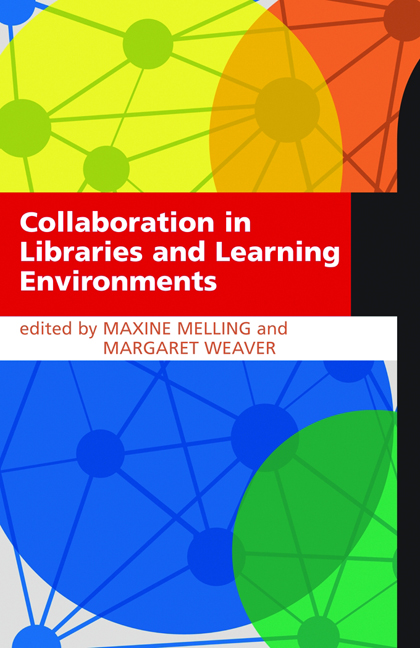Book contents
- Frontmatter
- Contents
- Contributors
- Introduction
- Abbreviations
- 1 The changing higher education context
- 2 Connecting with the student perspective
- 3 Working with professional associations
- 4 Culture, values and change: observations from three consortia in Canada
- 5 Managing complex change collaboratively
- 6 Leadership skills for collaboration: future needs and challenges
- 7 Knowing me … knowing you: the role of technology in enabling collaboration
- 8 Space: changing the boundaries
- 9 Collaborative service provision through super-convergence
- 10 Joint-use libraries and transformational change
- Index
4 - Culture, values and change: observations from three consortia in Canada
Published online by Cambridge University Press: 08 June 2018
- Frontmatter
- Contents
- Contributors
- Introduction
- Abbreviations
- 1 The changing higher education context
- 2 Connecting with the student perspective
- 3 Working with professional associations
- 4 Culture, values and change: observations from three consortia in Canada
- 5 Managing complex change collaboratively
- 6 Leadership skills for collaboration: future needs and challenges
- 7 Knowing me … knowing you: the role of technology in enabling collaboration
- 8 Space: changing the boundaries
- 9 Collaborative service provision through super-convergence
- 10 Joint-use libraries and transformational change
- Index
Summary
Introduction
Cultural change. It's a common phrase these days as most of us grapple with organizational transformation brought about by technological advances, budget constraints and numerous other factors. How do we cause cultural change? What are the new values essential to effective collaborations?
The answers are difficult because the questions are wrong. Anyone trying to ‘cause cultural change’ or invoke ‘new values’ has already missed the point. Let's refocus the questions and open up some new opportunities. The more appropriate question is framed as ‘how do we nurture effective organizational cultures and their underlying values?’
While discussing culture and values in abstract terms is important, it is often not directly applicable to the real world situations we face in academic libraries. As a result this analysis explores these issues through the lens of specific collaborations and partnerships. The nature and importance of values and culture will be examined by investigating the implementation and sustainability of three Canadian collaborations: the TriUniversity Group of Libraries (TUG), the Scholars Portal of the Ontario Council of University Libraries (OCUL) and the Canadian Research Knowledge Network (CRKN). These three initiatives, while different in scale, approach and focus, share common characteristics which have made them successful. Their longevity (each one is more than ten years old) is evidence of a strong foundation and an ability to adapt.
Background
Collaborations, partnerships, joint ventures and collectives of all sorts and sizes have become commonplace in academic libraries. The USA has been a leader in recognizing the power of working together. The Ohio College Library Center, formed in 1967, gradually transformed into OCLC, the largest library co-operative in the world with over 25,000 member libraries (www.oclc.org). Hirshon's review of OhioLINK (2002), an early and influential state-wide initiative, outlines the organizational and culture adjustments essential to success. This focus continues with the recent creation of innovation projects such as 2CUL, the ‘transformative and enduring partnership’ of the Cornell University Library and the Columbia University Libraries (www.2cul.org). The extent and depth of collaboration as a key academic library strategy is best illustrated by the formation and growth of the International Coalition of Library Consortia (ICOLC; www.library.yale.edu/consortia), which now has over 200 participating consortia globally.
- Type
- Chapter
- Information
- Collaboration in Libraries and Learning Environments , pp. 51 - 68Publisher: FacetPrint publication year: 2012



